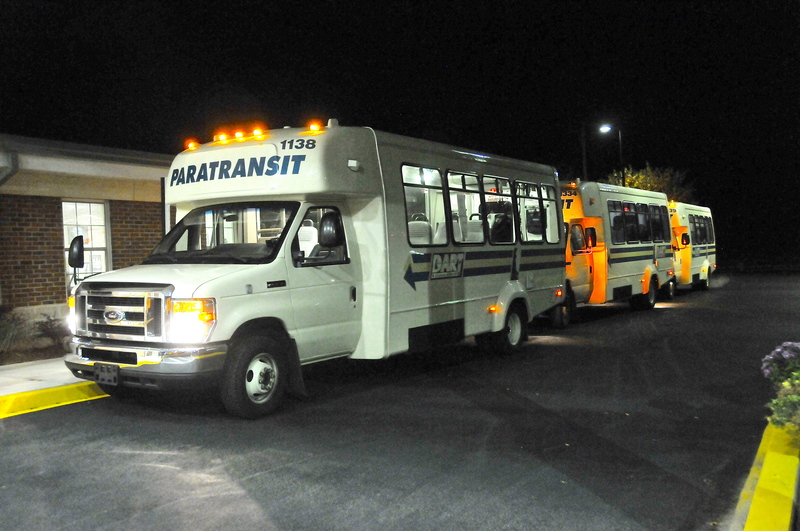Public comment on proposed reforms to Delaware's public transportation system has resulted in changes to the plan, said Delaware Department of Transportation Secretary Shailen Bhatt.
Delaware Transit Corporation and DelDOT staff conducted a series of public hearings last year to announce plans for more fixed-route service, changes in paratransit service and higher fares. What they heard was that the proposed increases for DART First State service were too much, too fast.
Bhatt said paratransit fares will increase over three years instead of two. Fares within three-quarters of a mile of fixed routes will increase from the current one-way charge of $2 to $3 on July 1 and up to $4 in July 2016. Fares outside fixed-route zones will increase from $2 to $4 on July 1; $5 in July 2015; and $6 in July 2016.
The original plan called for fare increases to begin in March. “We heard from private transportation providers that any changes to paratransit service and fares this fiscal year would create an immediate challenge, since their budgets are already in place,” Bhatt said.
Under the current system, all paratransit riders pay the same fare no matter where they live. Bhatt said changes to that fare structure are imperative because the average one-way paratransit trip is $47. Bhatt said the cost to provide paratransit service has increased 233 percent over the past decade to the point where nearly half of the transit system's total budget is spent on only 8 percent of its riders.
The federal Americans with Disabilities Act requires DelDOT to provide paratransit service within three-quarters of a mile of established bus routes. Delaware has never followed that regulation; it has instead provided door-to-door paratransit service in all corners of the state.
DelDOT had proposed complying with federal law providing bus service to paratransit riders who live outside federally mandated ADA zones, but they would have to pay three times as much in fares and be scheduled for rides using a priority system and as space is available.
During a public hearing in Georgetown, Ken Bock, CHEER deputy director, said that plan would reduce service to nearly 80 percent of paratransit bus riders in Sussex County who live outside an ADA zone.
The Delaware Transit Corporation also announced plans to redesign its trip negotiation process for paratransit services. “This is a tool used by transit agencies to prioritize trips and negotiate with passengers to maximize the number of passengers served,” Bhatt said.
More time to develop options
Bhatt said because of concerns raised during the hearings, changes in the scheduling process would be delayed until after September to allow more time to develop transportation alternatives. The current paratransit system offers no flexibility in scheduling trips. “Because of federal law, all trips are treated the same,” Bhatt said. “We can't ask where riders are going.”
He said people needing doctor's appointments or rides to their jobs are in the same queue as riders going shopping.
“We need other options to make it more efficient,” said DelDOT spokesman Geoff Sundstrom.
DelDOT is exploring development of a third-party option such as taxi rides, which is working in other states. “People are willing to accept poor service because they are afraid of the unknown,” Bhatt said. “They don't hear that we can provide better service; they only hear that we could be changing what they already have.”
The poor service he is referring to is not about the staff and bus drivers, but the current system of scheduling paratransit rides. He said he gets numerous letters and emails from people complaining they have to wait two hours or more for rides. Transportation staff got an earful during the public hearings from dissatisfied riders talking about the inconsistency of scheduling.
“It's because we are driving people all over the place; we are too over-subscribed,” Bhatt said.
Fixed-route fares throughout the state will be increased starting Feb. 9 over a three-year period. Cash-fare rates will increase from the current $1 for a one-day trip to $1.50 this year, $1.75 in 2015 and eventually $2 in January 2016. Reduced-fare rates will increase from the current 40 cents to 80 cents in 2016. The popular daily pass will increase from $2.10 to $3.15 on Feb. 9 and up to $4.20 in January 2016.
“While fares will still increase at a lower rate, everyone who is currently being served by paratransit will continue to receive this service until we have concluded our consultation with stakeholders,” Bhatt said.
FARE CHANGES – July 2014 to July 2016 (one way)
Paratransit in ADA zones: $2 to $4
Paratransit not in ADA zones: $2 to $6.
Fixed route cash: $1 to $2
Fixed route reduced rate: 40 cents to 80 cents
Daily pass: $2.10 to $4.20
An ADA zone is within three-quarters of a mile of an established DART route.






















































